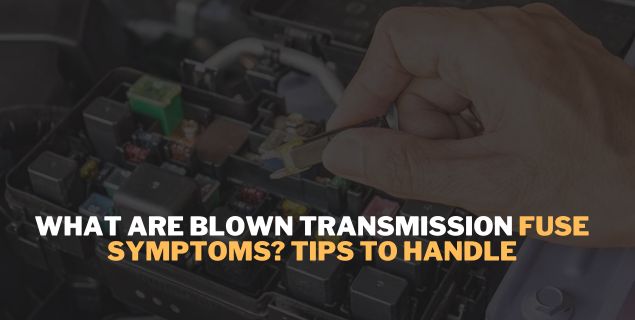When it comes to the intricate workings of your vehicle, the transmission plays a crucial role in ensuring smooth and efficient operation. However, like any other component, the transmission system is susceptible to issues that may disrupt its function. One such problem is a blown transmission fuse. In this article, we will explore the symptoms associated with a blown transmission fuse and provide practical tips on how to handle this issue effectively.
And I hope this article will be helpful for you and it will be enough for you to solve your Blown Fuse Transmission problems and I also assure you that I will write this article from my heart and Please share this article with your relatives and friends So that those people can also benefit from it and I will try to make it good. Thank of all my viewers!
What is a Transmission Fuse?
Before delving into the symptoms and tips, let’s start by understanding what a transmission fuse is and its role in your vehicle’s transmission system. A fuse is a protective device designed to interrupt the electrical circuit when excessive current flows through it, preventing damage to the components.
In the case of a transmission fuse, it safeguards the transmission control module and other electronic components from potential damage caused by electrical faults. When the fuse blows, it disrupts the electrical supply to these critical components, leading to various symptoms that can indicate a problem in the transmission system.
Blown Transmission Fuse Symptoms:
- Unresponsive Transmission:
- One of the primary symptoms of a blown transmission fuse is an unresponsive transmission. You may notice difficulty shifting gears, delays in gear engagement, or the transmission not responding to your input.
- Warning Lights on the Dashboard:
- Modern vehicles are equipped with advanced onboard diagnostics systems that can detect issues in various components, including the transmission. A blown transmission fuse may trigger warning lights on the dashboard, such as the check engine light or transmission warning light.
- Failure to Start:
- In some cases, a blown transmission fuse can prevent the vehicle from starting altogether. This is due to the disrupted electrical supply to essential components, including those involved in the starting process.
- Loss of Power:
- A decrease in power or acceleration can be another symptom of a blown transmission fuse. The transmission system relies on precise electronic control, and any disruption can affect the overall performance of the vehicle.
- Strange Noises or Smells:
- Unusual noises or smells, such as grinding sounds or a burning odor, may indicate a transmission issue related to a blown fuse. These symptoms should not be ignored, as they could signify damage to the transmission components.
- Overheating Transmission:
- A blown fuse may also contribute to the transmission overheating. Without proper electronic control, the transmission may not operate efficiently, leading to increased friction and heat.
- Flickering Lights:
- While driving, you might notice flickering interior or exterior lights. This could be a sign of an electrical issue, and a blown transmission fuse should be considered as a potential cause.
Tips for Handling a Blown Transmission Fuse:
Now that we’ve identified the symptoms, let’s explore practical tips for handling a blown transmission fuse and restoring your vehicle’s functionality.
- Check Other Fuses:
- Before focusing solely on the transmission fuse, inspect other fuses in the vehicle’s fuse box. A blown fuse in another circuit may also affect the transmission system. Replace any blown fuses with ones of the same amperage.
- Identify the Root Cause:
- Investigate the root cause of the blown transmission fuse. Look for exposed wires, damaged connectors, or any signs of a short circuit. Addressing the underlying issue is crucial to prevent the problem from recurring.
- Inspect Transmission Fluid Levels:
- Low transmission fluid levels can lead to overheating and increased friction, potentially contributing to a blown fuse. Check the transmission fluid levels according to the manufacturer’s recommendations and top up if necessary.
- Examine the Battery:
- A weak or faulty battery can cause electrical issues, including blown fuses. Ensure that the battery terminals are clean and secure. Consider testing the battery voltage and replacing it if needed.
- Seek Professional Assistance:
- If you are unable to identify the root cause or if the issue persists, it’s advisable to seek professional assistance. Automotive technicians have the expertise and diagnostic tools to pinpoint and resolve complex transmission problems.
- Regular Maintenance:
- Implementing a regular maintenance schedule for your vehicle, including transmission checks, can help prevent issues before they escalate. Routine inspections can identify potential problems and ensure the longevity of your transmission system.
- Use High-Quality Replacement Fuses:
- When replacing a blown transmission fuse, opt for high-quality replacement fuses with the same amperage rating. Using substandard fuses may lead to further electrical issues and compromise the safety of your vehicle.
Conclusion:
In conclusion, a blown transmission fuse can manifest through various symptoms that affect the performance and drivability of your vehicle. Understanding these symptoms and implementing practical tips for handling the issue can save you time, money, and potential complications down the road.
Regular maintenance, prompt identification of the root cause, and professional assistance when needed are essential aspects of ensuring the reliability and longevity of your vehicle’s transmission system. By taking a proactive approach, you can enjoy a smoother and more trouble-free driving experience.
And I have tried to make this article better and better, now you can make it even better by sharing it with others and all of you must express your opinion that how do you like it, I have told you before that this helps me write better articles

